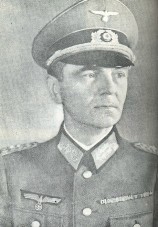Friedrich Paulus
|
|
Friedrich Wilhelm Ernst Paulus (September 23 1890, Breitenau – February 1 1957, Dresden) was a German general, later promoted to field marshal, during World War II.
Paulus was the son of a schoolteacher. He tried, unsuccessfully, to secure a cadetship in the German Navy, and briefly studied law at Marburg University when that failed. He left the university and joined the 111th Infantry Regiment as an officer cadet in February 1910. He married Elena Rosetti-Solescu on July 4 1912.
When World War I began, Paulus's regiment was part of the thrust into France, and he saw action in the Vosges and around Arras in the autumn of 1914. After a leave of absence due to illness, he joined the Alpenkorps as a staff officer, serving in Macedonia, France, and Serbia. By the end of the war, he was a captain.
Paulus remained in the scaled-down Reichswehr that came into being after the Treaty of Versailles and was assigned to the 13th Infantry Regiment at Stuttgart as a company commander. He served in various staff positions for over a decade (1921-1933) and then briefly commanded a motorized brigade (1934-1935) before being named chief of staff for the Panzer headquarters in 1935. He remained in that post until 1939, when he was promoted to Major General and became chief of staff for the German Tenth Army, with which he saw service in Poland, the Netherlands, and Belgium (by the latter two campaigns, the army had been renumbered as the Sixth Army). He was named deputy chief of the German General Staff in 1940, and in that role he helped draft the plans for the invasion of the Soviet Union. He became commander of the German Sixth Army in January 1942 and led the drive on Stalingrad.
Against his better judgment, he followed Adolf Hitler's orders to hold the Army's position in Stalingrad under all circumstances, even after his forces were completely encircled by the enemy. A relief effort by Don Army Group under Field Marshal von Manstein failed, inevitably, because Paulus was refused permission to break out of the encirclement. The 6th Army was defeated together with its Romanian allies and Russian auxiliary troops by the Red Army under Marshal Georgy Zhukov in January 1943. The battle was fought with terrible losses on both sides and the most unimaginable suffering, scarring the Russian and German nations for several generations.
Paulus's inability or unwillingness to save his men by taking a decision against the will of Hitler to extricate the army from an impossible position puts him in an historically unfavourable light. However, he also refused to take his own life as Hitler had suggested. Paulus was expected to hold Stalingrad to the death. Hitler promoted Paulus to the rank of field marshal, after the Sixth Army's fate was sealed. Since no German field marshal in history had ever surrendered, the implication was clear.
Despite this, he made a surrender (of sorts), hours after he was raised to the marshal's rank, in February 1943. He became a vocal critic of the Nazi regime while in Soviet captivity, joining the Russian-sponsored National Committee for a Free Germany and appealing to Germans to surrender. He later acted as a witness for the prosecution at the Nuremberg trials. He was released in 1953, two years before the repatriation of the remaining German POW's (mostly other Stalingrad veterans) who had been designated as "war criminals" by the Soviets.
Paulus remains a controversial historic figure, due to his late conversion to the anti-Nazi cause and perceived spineless behaviour towards Hitler. He is frequently unfavourably compared with Erwin Rommel, who came from a similar background of a family with no great military distinction, who was also much favoured by Hitler, and whose resistance to his patron led to his being forced to end his own life by swallowing cyanide.
Friedrich Paulus died in East Germany, as an inspector of police.
Naming issue
Paulus was also known as von Paulus. The von in the name is not authentic, a misconception presumably based on the fact that for many German "noble families" the career of officer in the armed forces was traditionally popular for at least one of their sons. Many German officers and generals carried the "von" in their names. Paulus was the son of a minor official, one reason why he was promoted by Hitler who saw himself in the same light - a genius from humble background.

